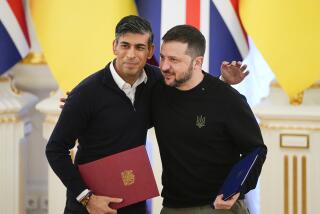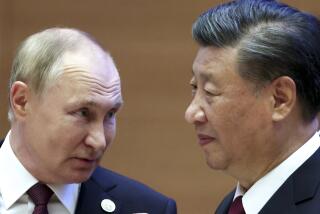Major Lauds Gorbachev and Vows Food Aid
- Share via
MOSCOW — Expressing the Western world’s relief that Mikhail S. Gorbachev has returned to power, British Prime Minister John Major said after meeting with the Soviet president Sunday that failure of the hard-liners’ coup was proof of what Gorbachev has accomplished.
The first foreign leader to meet with Gorbachev since the Aug. 19 putsch, Major also promised that the West will help avert famine in the Soviet Union this winter and declared unabashed support for Baltic independence.
Major indicated that Gorbachev appears to be sharing power with Russian Federation President Boris N. Yeltsin but that the former rivals are now working together to ensure the triumph of democracy and reform.
“The failure of the coup is a measure of what has been achieved by Gorbachev over the years,” Major told a news conference after two meetings with the Soviet leader.
He also praised Yeltsin, who led the popular revolt against the coup plotters, for “his determination and staunch bravery that faced down the perpetrators.”
Major paid a daylong visit to Moscow in his capacity as chairman of the Group of Seven wealthy democracies that promised food aid for the Soviets during the G-7 July summit in London.
Noting that 50 years ago Britain began shipping food to the north Russian port of Murmansk, Major said the Soviet Union could count on the West for help with the current food crisis that threatens widespread shortages and growing social unrest.
“Again this winter we may face the need to help Soviet people through acute difficulties,” the prime minister said.
He said the European Community will distribute 85,000 tons of food this autumn but that radical reform of the Soviet economy will be necessary before more substantial aid will be forthcoming.
The 12-nation EC is prepared to send technical crews to help the Soviets improve food distribution, Major said. Millions of tons of agricultural goods spoil before they ever get to Soviet markets because of an antiquated transport system and widespread corruption and theft.
Major took up a theme likely to please the reform-minded nations of Eastern Europe, promising to urge the European Community to fill the food baskets destined for the Soviets with the agricultural surpluses amassed by their former Communist allies.
The Soviet Union’s economic crisis has prevented Moscow from buying the commodities it usually acquired in Eastern Europe. This has left the struggling new democracies awash in food that no one will buy.
Western countries, particularly the United States, have resisted proposals that the Eastern European surpluses be bought on behalf of the Soviet Union, arguing that such a bailout would encourage continued inefficiency on both sides and cut into the potential market for Western sales to the Soviets.
Gorbachev outlined his plans for the Congress of People’s Deputies, which opens today, including the new shape he envisions for a federation pressured by independence declarations by 10 of the 15 Soviet republics.
Major said he is not at liberty to disclose details of Gorbachev’s plans for the Soviet Union’s future, but he made no secret of British support for independence for the three Baltic republics seized by Soviet dictator Josef Stalin in 1940 under a secret pact with Nazi Germany.
“We will have a toast to the independence of the Baltic states,” Major said during his meeting with the prime ministers of Latvia, Lithuania and Estonia. Gorbachev indicated during an interview aired on Soviet television earlier Sunday that the Baltic republics may be allowed to secede.
Britain will sponsor the three small states’ entry into the United Nations and back their moves to join other international organizations, Major said.
Asked whether he was concerned about reports that control of Soviet nuclear weapons could expand outside Moscow as the federation fractures, Major replied that he was sure “everyone would be worried if that were to be the case.”
He urged strong central control of the Kremlin arsenal and said he had been assured during his talks in Moscow that such precautions were being taken.
Major also won assurances from his Kremlin hosts that a Soviet defector’s family will soon be allowed to join him in London. Oleg Gordievsky, a former KGB station chief in London, has not seen his wife, Leyla, or their two daughters since he defected to Britain in 1985.
The liberal new KGB director, Vadim V. Bakatin, announced Friday that he would see that Gordievsky’s family is allowed to leave the country.
“I don’t believe it will be very long” before the family is reunited, Major said.
The family Gordievsky left behind six years ago had been under constant surveillance until Bakatin took over the KGB after the failed coup, the defector told British television last week.
Major also laid a wreath at the busy Ring Road tunnel in central Moscow, where three young men were killed while trying to block the advance of army tanks.
“To the memory of the few who gave their lives for the freedom of millions,” the prime minister’s dedication read.
More to Read
Sign up for Essential California
The most important California stories and recommendations in your inbox every morning.
You may occasionally receive promotional content from the Los Angeles Times.














